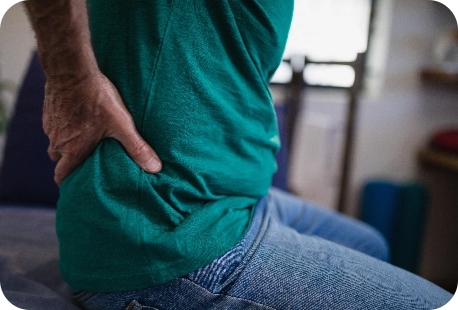

Physicians
Search

GENERAL INFORMATION
Our hips play an integral role in our ability to stand, sit, walk and run. Injuries to the hip can limit or decrease mobility. Puget Sound Orthopaedics (PSO) hip surgeons have performed procedures on hundreds of patients with hip impairments caused by arthritis, sprains, strains and fractures. Whether treatment consists of surgical or nonsurgical options, PSO surgeons are committed to helping patients get moving again.
The hip is a ball and socket joint and also one of the body’s largest joints. Working in tandem with the neighboring acetabulum (socket) in the pelvis is the femur (thigh bone), the strongest and longest bone in the body. The femoral head (ball) of the femur sits in the pelvis socket. The joint is coated with cartilage that allows for easy standing and sitting movements.
Because the femur is so strong it takes a great deal of force for it to break. Fractures most commonly occur from a car or motorcycle accident, a fall from a high distance and gunshot wounds. However, some elderly people can suffer a spontaneous fracture simply from standing.
Hip dislocations from a traumatic accident are serious injuries requiring emergency medical attention.
Osteoarthritis (typically found in older people) can be prevalent in the hip. It is sometimes referred to as the “wear and tear” arthritis due to the erosion of cartilage that coats the joints over time, leading to pain and inflammation. Osteoarthritis often affects the hip because it is a weight-bearing joint. Other types of arthritis, such as ankylosing spondylitis, that are located elsewhere in the body can also affect the hip.
Injuries to the thigh muscles often occur in athletes who play running sports such as basketball, soccer and track. There are three sets of muscles in the thigh: hamstrings, quadriceps and abductor muscles that are susceptible to strain. Muscle strain occurs when the fibers in the muscle tear due to being stretched beyond their limits.
Your doctor will discuss all treatment options with you. The best treatment for your injury or condition will be determined in combination with your overall health.
There are several nonoperative treatment options for hip pain. These might include physical therapy, pain management in the form of over-the-counter or prescribed medications and/or anti-inflammatories, injections and immobilization. If surgery is necessary, PSO hip specialists can perform a wide variety of procedures ranging from minimally invasive to major reconstruction such as hip joint replacement.
Our specialties extend beyond what you see here. If you have a special need, make an appointment with us!